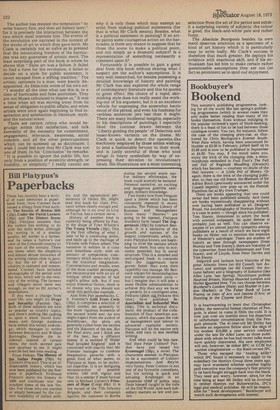Bill Platypus's
Paperbacks
There has recently been a revival of rural memories in paper. back form. Now Coronet have issued a trilogy from Fred Arch. er, The Secrets of Bredon Hill (35p), Under the Parish Lantern (35p) and The Distant Scene (35p). Platypus assumes that the author has nothing to do with the radio series, although his writing is of a similiar quality. Mr Archer is a farmer, and he takes a furrow's eye view of the Cotswold country at the turn of the century. There are times when the simplicity and almost obtuse innocence of the writing comes close to parody, but the air of a distant country is captured and remembered. Coronet have included photographs of the period with the text, which add to the veracity of the writing. The farmers and villagers stand there real enough, as real as Mr Archer's descriptions.
If you want a change from rural life, you might try Drugs and Sexuality (Panther 75p), Both of these subjects are now as popular as country topics, and there's nothing like cashing in upon a trend. David Solo. mons and George Andrews have edited this trendy anthology, which manages to writhe between Boccaccio and William Burroughs. Despite the incidental interest of Certain items, the work seemed pale and spurious to me. It might even be bad bed-time reading. From Pelican, The History of the Italian People • (70p), by Giuliano Procne!. This is an in. dispensable history, which has now been published for the first' time in paperback. Professor Procacci starts his history in 1000 and continues into the troubled times of the late 'forties. For those who are startled , or simply bemused by the current instability of Italian polit ics, and the paradoxical permanence of Italian life, might read this book for clues, Procacci writes clearly enough and, although he is no rival to Livy or Tacitus, has a certain verve.
History of another kind is currently being offered by Pan, in the shape of Tyler Whittle's The Young Victoria (35p). This is the first offering of what 1 take to be a continuing series, and leads up to the marriage of Victoria with Prince Albert. The narrative is written in a cosy and breathless style, with an amount of sympathetic commentary which leaves very little to the historical imagination. Conversations and moods, even of the most exalted personages, are reconstructed with an air of intrigue which smacks of last night's pillow talk. But if you enjoy historical fiction, there is no reason why you should not relish this particular example.
Also from Pan paperbacks, C. S. Forester's Gold From Crete (35p). It comprises a selection of short stories, set generally in the more vigorous moments of the second world war. As you might expect from the author of Hornbiower, the plots are. generally culled from the battles and the disasters of the sea. But the final story, and I think one of the best, has a different theme. It is entitled If 'Hitler Had Invaded England' and is concerned with exactly that, Mr Forester manages to combine imaginative panache with a great fund of what seems, to Platypus at least, to be technical expertise. It is an intriguing reconstruction of possible events, told with vigour and flair. In a similar if more factual vein is Michael Calvert's Prisoners of Hope (Corgi 40p). It is the record of the 77th Infantry Brigade, and their campaign against the Japanese in Burma
during the second world war, For military aficionados, the book could scarcely be bettered. Personal narrative, an exciting and dangerous guerrilla campaign, military knowledge.
Two books now from Penguin upon a theme which has been constantly repeated in recent months. The Pelican Library of Business and Management (how many " libraries " are going to be opened, Platypus wonders) have issued The Juggernauts (65p) by Graham Bannock. It is a narrative of the growth and success of the largest corporations which, as even Platypus knows, are beginning to rival the nations which harbour them. Not only in economic potential, but in social structure. This is a detailed and well-argued book. It contends that the juggernauts have grown_ faster than even their capability can manage. Mr Bannock argues for decentralisation and smaller economic units — but I imagine that it will take a more flexible administration to achieve this than any we have at present. In a contingent area, Pelicans (plain old, Pelicans this time) have published Industrialism And Industrial Man (60p). This is technical document, the product of the collaboration of four American academics, which discusses the role of Management and labour in
advanced . capitalist society. Platypus will let the matter rest there, and turn to less rarefied writing.
And what could be less rarefied than Peter Ustinov? Panther have just issued his Krumnagel (50p), a novel. The characters seemed, to Platypus, to be a succession of Ustinov impersonations. And they're very funny. Peter Ustinov is not one of my favourite comedians, but his writing is quick and amusing. Krumnagel is an American chief of police, who finds himself caught in the toils of the Old World. And such subsidiary matters as law and justice.
































 Previous page
Previous page